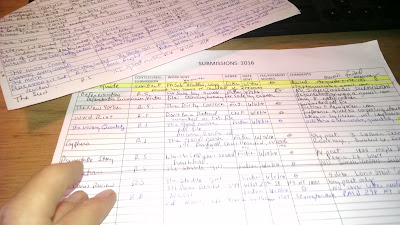Just hours after my last post about my experience with Sixfold Magazine, I received the final results. My short story made it through all three rounds and was ranked number 20 out of 287. It did not however win any prizes (first place was $1000) nor will it be published at all (they only publish the top fifteen stories) but I still feel like a huge winner. There was also a sense of accomplishment gleaned when I saw that the first and second place winners were stories I had also ranked very high. So even though I am not yet writing prize winning stories, I can at least recognize them.
I only paid a $5 entry fee, and in return I was required to read and comment on eighteen manuscripts, which meant more editing experience. As I've been told many times by other writers and past professors, if you want to write, then READ!
In addition to the manuscript reading experience, I received comments from six readers in round one, nine readers in round two and fifty-four readers in round three. Of those sixty-nine total readers only four gave me just a single line or two of feedback. The rest gave me very detailed comments. Some wrote well over 500 words. Most were a great mix of the stories strengths coupled with opportunities for improvement.
After reading through them all, trends could be seen. Six readers commented about typos and punctuation issues. This was not a surprise. I get excited about story line and dialogue and I neglect grammar details. That's the "creative" part of my writing. It's also the lazy part of my writing. At least it's an easy fix. Several others zeroed in on my specific language choices and most appreciated my voice, but a few felt my specific word choices were inconsistent with my main character. With a thorough read through, I saw what they meant.
That's the funny thing about writing. When you are in the moment, when the story or poem or novel chapter is fresh, you are blinded. Your mind reads what it wants to read, thinks you've written something you haven't, and often gives you more credit then you deserve. Thus the reason we all need writer friends, be they personal or through an on-line group, friends who can hit you between the eyes when you need it.
It's also an excellent idea to write your piece, then set it aside for a few days and read it again. Mistakes, character arc issues, plausibility concerns, mundane spelling errors, will leap right off the page at you. An embarrassing example; I misspelled my main characters name. At the beginning of my story she was Aves, but on the last page she was Avis!
I was so impressed with this SIXFOLD method of using their writers to be their readers, that I'll be entering some of my poems for their January Contests. If you write fiction or poetry, you should definitely do the same thing. It's a lot of bang for your five bucks.











